Victim’s family denied from reading impact statements in juvenile case

HUTTO, Texas (KXAN) — The family of Faith Monreal, a 15-year-old shot and killed by another teen, said navigating the juvenile justice system after Faith’s death made everything even more painful.
“We didn’t get the justice we feel she deserved,” Faith’s mother Vanessa Brown said. “It–it hurts. It doesn’t feel real.”
The juvenile system focuses on the rehabilitation of the person responsible for the crime just as much as it works to get justice for victims. Protections for respondents – the term used for the accused and/or responsible minors – include anonymity and shielding details of the case from the public.

Even though KXAN has covered this story for two years, because of those protections, this is the first time we’re getting a glimpse into the other side. The case is over. The teen respondent pleaded guilty to Deadly Conduct and her father pleaded guilty to making a firearm accessible to a child, according to one of the defense attorneys on the case.
In this story, we explore both sides of this case: the difficulties Faith’s family endured in a system that’s also designed to protect the teen who took their daughter’s life, and the reason the juvenile justice system is designed the way it is.
‘A nightmare’: Faith’s story
In December 2021, Faith went to a friend’s house.
“What was supposed to be a harmless sleepover turned into a nightmare,” Vanessa said.
Police said Faith was shot in the head. After spending a few months on life support, she died the following February.
“She was my everything,” Vanessa said.
Faith was a sophomore at Hutto High School at the time. She was supposed to graduate this month. Her parents still picked up a cap and gown for her and made a graduation invitation with re-purposed photos of Faith showing her wearing graduation garb.
“Instead of celebrating with her and watching her walk the stage, we’ll be celebrating with her at her gravesite.”
Vanessa Brown, Faith Monreal’s mother, on the fact that Faith should be graduating from high school this year.
Vanessa said Faith loved animals and had dreams of becoming a veterinarian. She was a big sister to three younger siblings.
“Oh, they looked up to her. She was the mama — the second mama in the house,” Vanessa said.
This pain, Vanessa said, was only just the beginning. As the case went through the courts, “we got told multiple times, ‘She’s 16 — she’s 15.’ There’s multiple things they can’t tell us,” Vanessa said.
When it came time for the sentencing, Vanessa said a judge denied the family the opportunity to read their impact statements in front of the respondent.
“We were told it was too hard for the defendant,” Vanessa said. “For a simple letter, for how I feel about how she took my daughter’s life and I couldn’t even express that.”
‘Goal is to have them rehabilitated’: How the juvenile justice system worked in this case

“If a court believes the reading of victim impact statements could be disruptive to the proceedings, they don’t have to allow them to be read,” Claire Carter, one of the defense attorneys on the case, said.
Carter said evidence showed this was a tragic accident.
“There was never a question about the profound remorse in this case,” she said. “It was clear from the first 911 call, it was clear throughout the reports, it was clear through all interviews with the juvenile respondent.”
She said the teen received an eight-year Determinate Sentence Probation and accepted responsibility for engaging in deadly conduct, a third-degree felony.
Here’s how that sentence works. The teen will be on juvenile probation at least until their 18th birthday. After that, Carter said, a judge will decide if she has “worked diligently toward their probation, and if so, the case can be terminated at that time,” meaning the sentence would be complete. If a judge rules the other way, the probation can continue into the adult system for the remainder of the original eight-year sentence.
“The goal is to have them rehabilitated and go into society without being haunted by events that happened when they were young,” Carter said regarding the protections given to minors. “Between 10-16 specifically, children are not fully developed in terms of brain development, social development, emotional development.”
That’s a big reason why, Carter said, teen respondents aren’t named publicly and the details of their cases are kept out of public record.
“When a case involves a juvenile, a victim’s family is often frustrated by the same anonymity, the same protections used to shield the person accused of the crime. And that’s frustrating for people who are victims of a crime because they don’t feel they have the same level of transparency,” Carter said. “It would be impossibly difficult to participate in proceedings or observe proceedings where the interest and concern appeared to be about somebody other than your own child.”
Moving forward
The Monreals are now trying to work with county and state leaders on gun safety campaigns with a focus on safe firearm storage.
“I never thought in a million years I would have to ask a parent that is going to be watching my child if they have loaded guns just lying around,” Vanessa said.
Faith continues to be recognized at crime victim events in Williamson County, including one, pictured below, that included a gallery of some of her art.

Faith’s family plans to hold an honorary graduation celebration for her next week.
Copyright 2024 Nexstar Media, Inc. All rights reserved. This material may not be published, broadcast, rewritten, or redistributed.
For the latest news, weather, sports, and streaming video, head to KXAN Austin.

